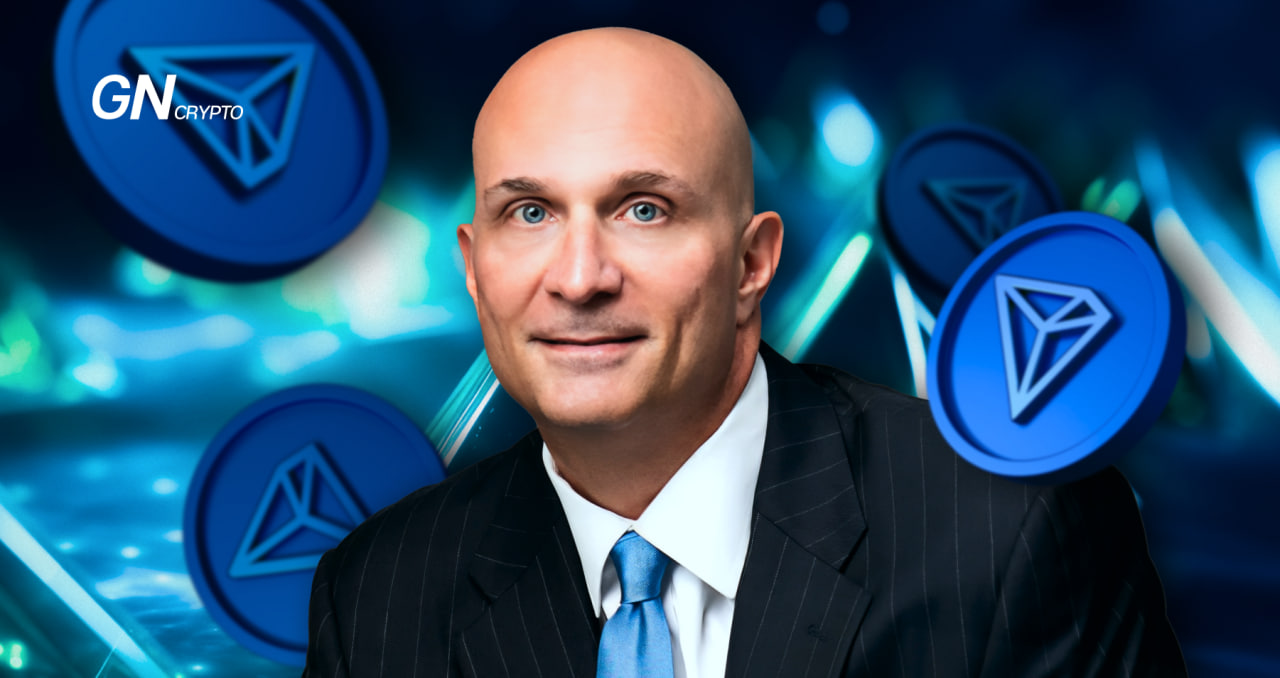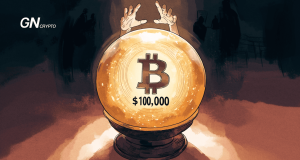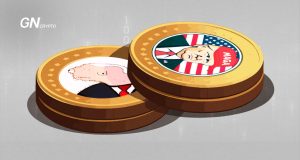Tron DAO’s Ecosystem Development Director on Blockchain and More

Over the past year, Tron (TRX) has shown a great performance, with its price rising by 30%. We decided to find out why so we reached out to Tron and had a conversation with Tron DAO’s Ecosystem Development Director David Uhryniak. And here’s what we found out.
GN: David, thank you for agreeing to this interview. To start, I'd like to ask, are you by any chance of Ukrainian ancestry?
David: On my father’s side, I guess. My paternal great grandparents emigrated from Ukraine. I'm not exactly sure of the city they lived in. I do know I still have cousins somewhere in the Poland-Ukraine area. I know I had some cousins living in Kyiv for a while, probably up until the war. Then they went back to Poland with their parents. But yeah, there's some ancestry in that area.
GN: That's cool. Do you like anything Ukrainian, like cuisine? Borsch, perhaps?
Davіd: I've never had it.
GN: Well, that’s shocking. I highly recommend you try it.
David: What is it exactly?
GN: The beetroot soup.
David: Yeah. I've never tried that.
GN: Moving on, let’s do a bit of an introduction – you work from Tron.
David: I do. I lead the ecosystem development here at Tron, and I've been here for almost two years now. I'm based in the US in Chicago, and we have a fairly sizable team in the US and we're spread out across the country from Los Angeles to Orlando to New York and all over.
GN: That's cool. And what is the company working on these days? Could you tell us a little bit about that?
David: We always stay very busy and continue to be a very innovative company. One of the most recent things that we've done is, just this past July, – we worked closely with RWA DAO to help them roll out a product called Staked USDT. It's the first entry into tokenized, real-world assets on the Tron blockchain.. And, you know, we view that as being something that's going to help propel the growth of the blockchain industry as it further facilitates the convergence between TradFi and crypto and blockchain. So we're pretty excited about it. It operates through the decentralized platform JustLend, which is operated by JustLend DAO. The JUST ecosystem boasts the highest TVL on Tron and they're certainly one of the highest TVLs among all Defi projects.
GN: You touched upon blockchain development. Where are we at in that regard? Compared to five years ago or ten years ago, has it evolved significantly or has the evolution been quite slow and steady?
David: Good question. It depends how you want to measure it. If we measure by comparing the number of crypto users to the number of internet users at similar stages in their respective developments, crypto seems to be slightly ahead of where the internet was at the same point in its evolution. So, you know, I think it's moving along well over the last few years.
I think the industry as a whole has attracted a significant number of new users. Probably a lot of them were shaken out during the recent bear market, but I think a lot of people continued to build right through it and they're going to be well positioned when things do turn. And it does seem like things are starting to turn.
So, we're in season five of our hackathon right now. These are events we run two or three times a year where early stage projects can enter and they are able to be reviewed by leaders from Web2 and Web3, as well as venture capital firms. And they get this great exposure and a chance to compete for a really significant amount of funding from Tron.
Just recently we crossed over 3000 entries into the hackathon, and that's the highest number of entries we've had in any of the hackathons. When you look at all five hackathons combined, we've had over 6000 entries. So this one hackathon is probably half of the total entries that we've seen overall, which is great. And I think, if anyone's looking for a sign that perhaps the bear market is coming to an end – maybe this is it. I don't know. But it certainly seems like it's a positive nonetheless.
GN: So, overall the interest is growing?
David: Yeah, I think that's true. If you look at it from a different perspective, Tron’s account growth is a testament to that. It's been quite incredible. Over the past 12 months, from this time last year to now, our total accounts have increased by over 63%. We have over 193 million accounts at this point, which is honestly quite amazing. We continue to see rapid growth in multiple regions throughout the world. So we're pretty pleased with that.
GN: The market appears to be sort of frozen at the moment. But, it looks like you're using this as an opportunity to further develop your project. Is that your approach, or are you also facing challenges?
David: Sure, we face challenges just like every other group in Web3 and crypto, but we're also using it as an opportunity to grow. And I think that's evident in our account growth and wallet holders. We continue to increase our adoption around the world: South America, Europe, the Middle East, Africa, and Asia. These are regions where we're seeing significant acceptance, and I believe this trend will persist as we continue to roll out new products and services for our users.
GN: Would you say that the developing nations are showing a growing interest in crypto and blockchain compared to advanced regions? Would you concur with that assessment?
David: In many of the emerging countries you're referring to, I believe their growing interest in crypto isn't necessarily about using the latest technology. It's more about the instability of their own currencies. For these nations, crypto and blockchain provide ways for them to mitigate the volatility of their home currency. The Tron network, for instance, has become a favored channel for mitigating that volatility. For instance, from my conversations with users in multiple countries, they say a similar thing. When they receive payments in their home currency, their first instinct is to convert it into a stablecoin via the Tron network as quickly as possible to use these stablecoins for their daily transactions in their daily lives.
“Blockchain on Not a Coke and Pepsi Environment”
GN: I do agree with that. I read a lot about that and the inflation rates and how Bitcoin and all the other cryptocurrencies are helping tackle that. Now, you mentioned that Tron is the preferred network, yet, we're also aware of Ethereum's presence. How would you compare yourself to Ethereum?
David: I think something that's important to note here is that this isn't a competitive thing – blockchain. The blockchain world isn't a Coke and Pepsi type of environment where you pick one. We believe in a very multi-chain future and a collaborative environment. So it's not about competition necessarily and one being better than the other. I think we're used for certain purposes, just as Ethereum is used for other ones. You're seeing a lot of chains evolve into having more unique use cases. To that end, we've developed the BitTorrent Cross-chain, which connects both to Ethereum and the BNB Chain. We lean more towards collaboration rather than competition. We're actually the only non-member owner within the Enterprise Securing Alliance. So we're willing to collaborate and work with really any chain out there if it's a relevant use case that we can get together on.
GN: All right. Well, I ask this question for a reason also, because it was kind of well-known that Justin Sun and Vitalik Buterin are often at odds with each other – a little bit like Coke and Pepsi. Does it, in your opinion, affect blockchain development, if at all?
David: One. I'm not familiar with any of those riffs or anything you mentioned, so I don't know about that, but I don't think that it really impacts blockchain development too much at the highest level. If those things do exist.
GN: Well, I've heard and read that they do but I guess we'll ask Justin Sun some time about that. Let's talk a little bit about Tron (TRX). Volume-wise, it seems to be doing quite well. The coin's price has increased by 30% over the course of the year. What contributed to this increase? Could you elaborate on that a little bit?
David: I can only speculate on the exact reasons for its success. I don't know if it's the actual reason it happened the way it did. But reflecting on the token's performance, I believe people recognize the value Tron contributes to the crypto world. There's a very relevant use case for blockchain. And I think as that gets recognized, there's a network effect. The more the chain is used, the more it's adopted. The next thing, I think, is that we've achieved significant traction among individuals. Probably the next frontier for us is commercial adoption, an enterprise adoption of our chain, which I think makes a great deal of sense when you look at some of the cost benefits and situations of other blockchains and consider the reliability and speed. There's a reason over 193 million people around the world want to use the chain. It's because it’s fast, secure and reliable. And those same attributes can spill over or be available to enterprises. So I think it's really just a matter of time before we become much more accepted in the enterprise space as well. So yeah, I think that's a big part of the movement. Plus, there is stability in Tron. It's a very solid chain and it continues to earn more revenue and produce more revenue every quarter. You look back at the first and second quarters of this year then it has really been quite good from a revenue perspective. And this is all public information. That's probably what is contributing to the rise. And actually it's not just this year. If you look at last year too, when everything was falling apart – Tron held steady. I think we had a pretty good 2022 as well.
To me, what that says is people really view Tron as a place of stability, as maybe a safe haven among the storm. At least that was the situation last year as we got into this year. I think we're still viewed as a safe haven, but also as something with a high level of growth and certainly something that is undervalued relative to the potential that lies. This is not financial advice, it’s just my opinion. It's possible that people might view this as being undervalued relative to the potential of where it could be.
GN: You said that it provides a safe haven. I guess you are kind of referring to the collapse of FTX and others.
David: I’m referring to the collapse of the market last year. I mean, most of the tokens were pretty negative. And I'm not sure of the exact performance of Tron, but just by watching it, I think we were pretty solid throughout the year. I don't think we had a big decrease, certainly not on the level that we saw other tokens have.
GN: And also it appears that the transit fee is much cheaper than that of Ethereum. Am I correct here?
David: Yes, that's correct. So if you look through August, the average cost to do a transaction on Tron was $0.21 and the average cost on Ethereum was $3.18. I think it really comes down to the delegated proof of stake, which is our consensus model and the way we operate. The resources in terms of energy and bandwidth versus just a straight gas fee. And it really helps to keep the costs low.
And let's say you're somewhere in one of those developing countries that we touched on earlier: if you're sending $20, you don't want to pay $3 or more as a fee. You want to pay as little as possible. So if your options are paying an average of $0.21 or $3, I think you're going to go with a $0.21 option. That makes more sense. Anyone would do that. You don't want to spend 30%, 15%, 20% of your money on a fee. And that's why we're emerging as this amazing change for emerging markets. But really, there's no one around the world that wants to spend money needlessly. I mean, that goes to any project that's developing or any enterprise that's building as well. So like I said, I think it's just a matter of time before we see even more adoption moving into the enterprise space.
“I’m team Hester Peirce”
GN: You said you're based in the US. How do you feel about the US Securities and Exchange Commission and its crackdown on the crypto industry? Does it affect Tron?
David: What do I feel about it? It affects everyone and the industry as a whole really. I just saw this the other day, the number of Solidity Developers that are in the U.S. has fallen pretty significantly year-over-year, or at least within the past two years. I forget what the exact numbers were, but it was like 40 percent of global blockchain developers down to 20 something percent. But don't quote me on those numbers. They're not exact, but they’re definitely directionally correct. Now, low 20% of global blockchain developers are in the U.S. and that's something that’s not good. It kind of puts the US behind the curve from an innovation perspective. And I think we need to really take steps to address that. The sooner the better. Around the world you see legislation or regulation being done to help people understand what the rules are within the crypto and stablecoins space. So we've seen good regulation coming out of Singapore, Japan. UAE, MiCA in Europe. All these countries are saying these are the rules of the road and companies are saying, okay, I can follow that. But in the U.S., it's still very much a regulation by enforcement situation, which is just causing people to leave.
GN: Which country is doing best in terms of providing relevant legislation on the subject?
David: I would say MiCA is probably the most comprehensive. But like I said, we've seen good progress from Japan. They've taken great steps, as has the Singapore Monetary Authority. I think we continue to see blockchain and crypto have the rules or have the rules delineated that will help it to grow.
GN: Well, let's hope that the US Securities and Exchange Commission understands that that is impeding the development.
David: I'm definitely on team Hester Peirce. I think if she was leading the SEC it would be a much different situation here in the U.S. So, we'll see how this develops. But I’m a big fan of hers and hopefully she can really get into a position where she can enact her views on the crypto world.
GN: Compared to Gary Gensler, she may indeed be a more favorable choice and we're hopeful that will be the case. However, my only question pertaining to Gary Gensler is, why do you think he had such a change of heart? We've all seen his MIT lecture where he appeared to be more open to crypto. Then he takes office, and his approach seems to be more restrictive, especially when compared to his predecessor, Jay Clayton, who was arguably more lenient. What do you think accounts for this shift?
David: That is true. We saw him teaching at, I believe it was Harvard or M.I.T., and he did seem to have different views. As for why he changed, I have no insight into that. You know, I've never met him. I don't know him personally, so it would be wrong for me to speculate on what made him change his mind. But it appears that he definitely has. For whatever his reasons are. Hopefully, we can have someone in that role that has a bit more open view of the crypto world and its meaning in the global economy.
GN: Totally concur with you. We've discussed the blockchain’s development and that it all depends on how you measure it. But what's the biggest challenge at the moment that you would pinpoint? Is scalability still at the forefront or is it something else in terms of further developing this domain?
David: In terms of adoption, you mean.
GN: Developed both in terms of adoption and generally making the network more efficient?
David: Well, I think the biggest issue in my mind, or at least one of the biggest issues, is interoperability. I think that's probably the biggest thing that needs to happen to really try to drive the industry forward. You want to see all these changes connected and where users have the capability to move assets safely, securely, quickly and easily among chains. And I think that's where we need to get to.
GN: Do you think it's possible to do it in the next five years or so? Or will it take more time?
David: I think based on history, five years seems like a reasonable time period. Hopefully it happens much sooner than that. But yeah, in my view, interoperability is one of the critical drivers of the industry.
GN: To wrap things up, you touched on what Tron has been focusing on at the start of our conversation. Is there anything else you'd like to share on the topic that our readers might find intriguing?
David: We're an innovative company and we're going to continue to innovate and grow and provide a great product for our users. So we're really just interested in continuing to do that and offering new and improved and better services and products to our user base, and then continuing to grow our users throughout the world. One thing that is paramount to Tron is engaging with the community and it's interviews like this and other events that we're always trying to get out into the community to connect with them on some level. So it's about the community. I can't stress enough how important it is not only to us, but for the industry as a whole.
GN: And are you collaborating with any Ukrainian companies? We have quite a number of blockchain and crypto organizations.
David: Ukraine, and the whole area of Eastern Europe, has become a hotbed of emerging projects. No specific examples immediately come to mind, but we do have people who work at Tron that are based in Ukraine, so some of our Tron Ventures team is there.
GN: Well, it's great. We hope that they're safe and sound. Thank you so much, David, for this interview and talk to you soon again, hopefully.
David: Thank you. Great to meet you. Thank you for having me.
The content on The Coinomist is for informational purposes only and should not be interpreted as financial advice. While we strive to provide accurate and up-to-date information, we do not guarantee the accuracy, completeness, or reliability of any content. Neither we accept liability for any errors or omissions in the information provided or for any financial losses incurred as a result of relying on this information. Actions based on this content are at your own risk. Always do your own research and consult a professional. See our Terms, Privacy Policy, and Disclaimers for more details.

























